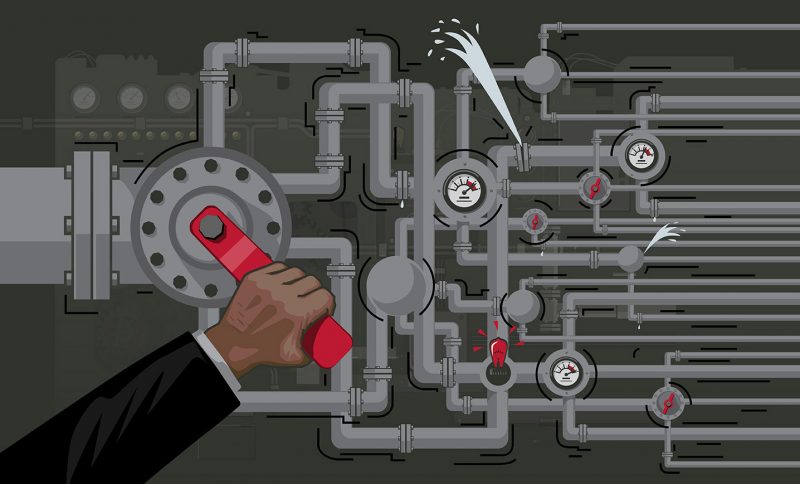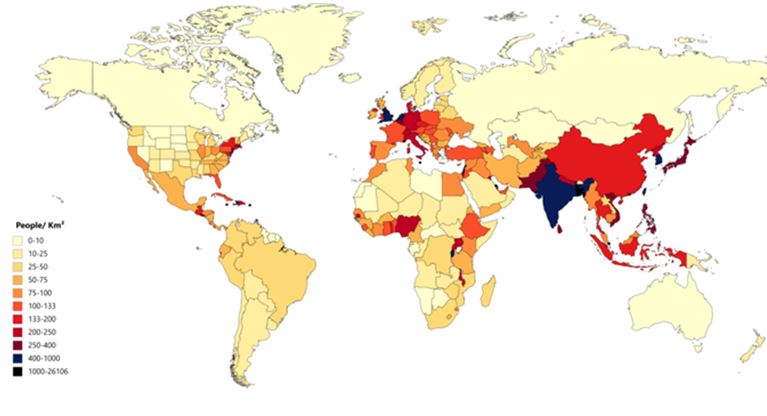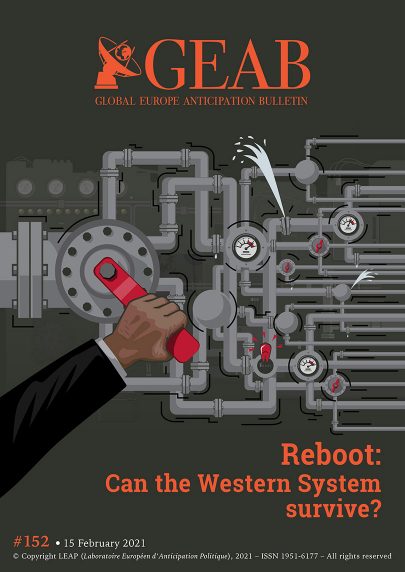GEAB 152

Particularly three phenomena concur to the distortion of our collective understanding of reality: the economic and mobility slowdown, the collapse of information systems linked to the pandemic, and the election of Joe Biden. All this creates a dangerous illusion of “calm after the storm” resulting in reduced vigilance. Therefore, and despite the whole bunch of fine avenues for reinventing the world, this bulletin is meant to be alarmist.
As Xi Jinping and Vladimir Putin desperately try to alert Western leaders,[1] the new 2021, much more than 2020, is a high-risk year for systemic reasons. As illustrated on the cover of this issue: the old financial-economic-social machine no longer matches the size of the flows produced by the multipolar world and any hastened reboot attempt is doomed to create disasters.
The message sent by the current pandemic must be heard: “our model was overheated”. Population density,[2] human mobility, consumption, etc. were all in the red, escaping any capacity for reorganization, and making us anticipate immense crises without a shadow of a doubt.
The risk of a pandemic will therefore not be eradicated by vaccines but by a socio-economic paradigm shift.
Without it, Covid-19, its mutations and other diseases will continue to take hold of our far too dense societies. It is therefore a quantum leap in terms of hygiene, reduction of mobility, decongestion of urban centres, rationalisation of economic flows, reinvention of health and climate protection models, that we must achieve. No less…

Fig. 1 – World population density 2019. Source: Wikipedia
Everyone was envisioning a kind of “ultimate crisis”, namely the climate crisis presented as an apocalypse. But there are many other crises along the road that will enable us to avoid this hypothetical “end of the world”: Financial crisis of 2008,[3] marking the obsolescence of the mechanics of monetary flows; EU-Russia geopolitical crisis of 2014, marking the crisis of the bipolar world of the Cold War;[4] Covid crisis in 2020, marking the unsustainability of the hyper-mobility model of a humanity of 8 billion individuals;[5]…
Each of these crises has created the conditions for the resolution of its causes, but none of them can be considered to be truly solved yet, especially in the West: even if new currencies are gradually being introduced (euro, yuan, cryptos, digital), the international monetary system is still based on the dollar, and the Western financial markets are still huge factors of volatility, bubbles and general economic instability. Furthermore, the banking system, although having been more reformed and consolidated than the financial system, still represents an immense brake on monetary digitalisation aimed at allowing the fluidity of exchanges and disintermediation between States-issuers and citizen-users of the currency (constituting an existential crisis for the banks). Plus, the Cold War reigns supreme. And, finally, everyone seems to be waiting for an illusory end to the Covid crisis to return to work with their car and go back to Marrakesh for the weekend.
But these last two examples, in a simple way, demonstrate the impossibility of starting again as before:
. the fear of the virus has emptied public transport of its users who will add to the immense number of everyday motorists, guaranteeing gigantic traffic jams that no more public investments will seek to relieve by building new expressways. This kind of crisis is soon to be self-regulated by the rapid understanding that remote work is better, at least for all those who can.
. as for weekends in Marrakesh (or equivalent), Europeans will soon realise that the place is taken: since the signing of the Abraham accords with Morocco and the US recognition of Moroccan sovereignty over the Western Sahara, Saudis, Israelis and Americans have discovered the riads they used to book for themselves[6]. But this trend does not only concern Marrakesh: the multipolar world is embarking on the “Roman roads”[7]… Jams are in sight.
But these examples are quite insignificant in view of what a “business as usual” restart will generate in terms of higher energy prices and geopolitical tensions on the one hand, and general inflation and social tensions on the other.
For these reasons, the pandemic break is exploited by countless political and economic decision-makers as an opportunity to precipitate the indispensable transition: the major recovery plans are there to finance it and, on the European side, the EU is rather well positioned to accompany the entire transformation process. This rather advantageous situation contributes to the feeling of lull, even a certain euphoria, which the election of Joe Biden on the other side of the Atlantic further reinforces, but which is nothing but the eye of the storm.
In fact, human society is in the process of inventing, experimenting and getting used to its new modes of interaction: thanks to ‘tele’-everything and the refocusing of activity (professional and entertainment) on the places where people live, reducing mobility and all related consumption; thanks to urban policies of the ‘quarter-hourly city’ type[8] with the strengthening of a (re)localized social life and services; thanks to decentralisation, family reunification and the return to provinces; etc.
However, whole sections of the old economic model are suffering because they will disappear if they do not get reinvented: tourism, sport, catering, events, culture… must reduce their physical footprint and change, partly in digital mode. For example, as far as catering is concerned, the big city centres were crammed with ever more establishments, while the suburbs and provinces desperately subscribed to fast-food chains and kebabs. We are certain that in the medium term, the restaurant industry will follow the movement “outside the walls”, offering very good prospects, finally, to the whole sector. But we are also certain, on the other hand, that this trend promises a lot of incomprehension, resistance and anger.
As far as tourism is concerned, we had already analysed in July 2019 that physical mobility had to increase in quality while mass tourism would have to move to local levels (parks close to residential areas) or to homes (e-tourism). Here again, the youngest and most innovative will find very good prospects, but the others will suffer…
Etc.
In this sense, the pandemic is a crisis leading us yet rather gently towards more sustainable paths to the future. But history has not said its last word: the negative energy load that the actors most rooted in the past are accumulating makes us see powerful shocks of attempts to restart in the old fashioned way.
Among these actors blocked in the past, there is a section of public opinion that is very poorly supported in their understanding of the current situation by an information system still ill-adapted to new realities. There also remain many rigid structures that are the result of the characteristics of the last century, as difficult to deactivate as they were efficient to anchor the old world, which are still in place and resistant to change, starting with those “states within the state” represented by many institutions, whether in Iran (Islamic Revolutionary Guard Corps) or the United States (Pentagon), to mention only those that worry us most in the short term.
All these actors are impatient to go back to the “before” they knew, pushing the community to recklessness. For example, the UK and the US, rather than coordinating themselves with the EU as encouraged by the European BionTech vaccine gift,[9] have started their vaccination campaigns by appropriating production in the hope of not only of reducing the length of an economic pause that is killing them but also of getting ahead of their European “ally”. In doing so, they are putting themselves, the West and the world at deadly risk, whereas it is likely that the EU was planning to set aside the time needed to change the major parts of the socio-economic machine … a time that the strength of its social systems allowed it to take. But one is always betrayed by his friends…
In this issue, we detail the economic and geopolitical risks that an America believing and making believe that it is back to “normal” is running for itself and for the world. In the same article, we also discuss the strengths and weaknesses of the European repositioning in the face of the looming American storm.
Furthermore, we make a new trip into the future of European space, as well as into the major challenges of WaterTech in the 21st century. Not forgetting our annual review of anticipations from the net and our usual investment recommendations, with a special focus on Bitcoin.
Join the GEAB Community on LinkedIn for more discussions on this topic.
________________________
[1] In Davos, both Xi Jinping and Vladimir Putin called for responsible multilateralism. The Chinese president explains that « building clans or starting a new Cold War, rejecting, threatening or intimidating others, imposing decoupling, disrupting supply chains or imposing sanctions to provoke isolation will only push the world into division and even confrontation. And confrontation will lead us to a dead end. » (source: Challenges, 25/01/2021), while the Russian President hammered: “I would like to repeat that the situation could develop in an unpredictable and uncontrollable manner if we sit back and do nothing to prevent it. And it is possible that we could see a real collapse in global development that could lead to a struggle of all against all”. (source: AgoraVox, 28/01/2021).
[2] Population density is the result of three factors which combine to form an exponential trend: quantitative demographic growth (soon 8 billion inhabitants, 10 billion announced for 2050); within this growing population, an increase in the proportion of people integrated into the globalised economic system; within this economically integrated population, an increase in the proportion of urban dwellers (rural exodus). The result is a humanity of 8 billion people living in increasingly tight quarters in a few cities. Source: Wikipedia and GEAB 2008
[3] Source: PostFinance, 05/09/2018
[4] Source: GlobalPolicyJournal
[5] Source : Covid19 : The end of global hypermobility, Gérard-François Dumont, Cairn, 06/2020, and GEAB 2020
[6] Sources: France24, 17/01/2021; France24, 10/12/2020
[8] Source: Boursomag, 07/01/2021
[9] At the risk of repeating ourselves, we are still amazed by the Anglo-Saxons’ blunder against the EU: appropriating for themselves the European BionTech vaccine financed by the European Investment Bank and immediately going into production across the Atlantic for American needs alone, while the production capacity that Europe had managed to keep (in this case in Belgium) went to serve the British imperative need for vaccination… the EU ending up with big-headed promises of non-existent (source: DailyMail, 23/01/2021) or inefficient British vaccines (source: France24, 12/02/2021). The EU will certainly not forget this lesson!

In our January Panorama of trends for 2021, we mentioned that the US was the main question mark on our map of the future. Part of this dark spot was [...]
In March 2019 our teams published a Reader’s Digest of the anticipations found on the net with the first key date of 2020 for which some analysts had announced the [...]
2020 has been particularly difficult for the European space industry. Besides the suffering from the COVID-19 crisis, the European space economy is also suffering from several other shortcomings. Today, we [...]
Many of us have grown up in countries where access to water is taken for granted; where a constant and secure supply of clean water has become the norm. Safe [...]
It's time to update our "money digitalisation" trend. If everything has taken the direction we anticipated two years ago, these experiments seem to have a hard time coming out [...]
- > Currencies: Landslide - > Oil: Fire-exposed - > Raw materials: Heavy stuff - > Big Tech: Turnaround in sight - > Pharma: Run away - > Beijing Olympic [...]

Comments